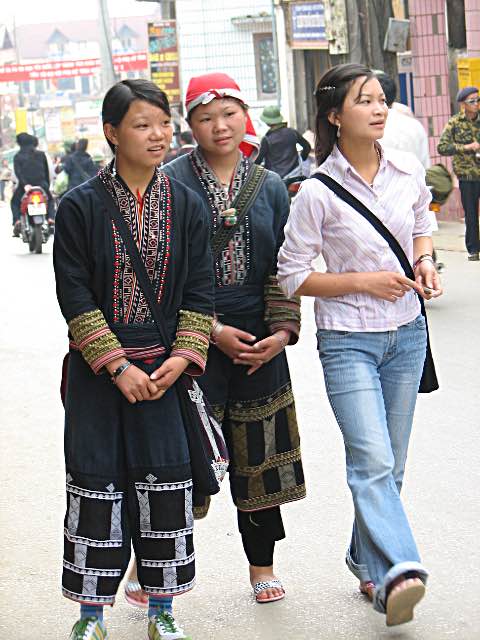|
The photo on the right shows three girls; the two of them on the left apparently of the Hmong Vietnamese ethnic minority, and on the right a majority ethnic Viet girl. They seem to be friends.
I saw them on the streets of Sapa in the hill country in the north of Vietnam.
Ethnicity (or race, or skin colour) is just one of the things that can set one lot of humans apart from another lot. And sometimes members of one group are not as friendly to members of another group as these girls seem to be.
Introduction
|
|
- Language
- Ethnicity
- Race
- Skin colour
- Ancestry
- Nationality
- Social class or cast
- Level of wealth or poverty
- Christianity
- Catholicism
- Eastern Orthodox
- Gnostic (one of many that are extinct - exterminated by main stream Christians)
- Pretestantism
- Anglican
- Lutherism (There even were or are several separate Lutheran congregations in just one small South Australian town, Tanunda. It seems that, even though they were all Lutheran, they could not agree on how they should worship.)
- Uniting Church
- Seventh Day Adventist
- Etcetera, etcetera
- Islam
- Shia
- Sunni
- Hinduism
- Indian
- Balanese
- Buddhism
- Mahayana
- Vajrayana
- Theravada
- And more...
|
|
What got me started on this subject?
For many years I've felt, for a number of reasons, that religion has been a disaster for human society. Also for many years Israelis (predominantly Jewish) have been fighting with (predominantly Muslim) Palestinians in the Middle East. Over the few months to the time I started this page the killing of Palestinians by Israelis in Gaza has been called, with justification, genocidal. The Israeli government says that they have the right to defend themselves from Hamas murderers who killed and kidnaped many Israelis without provocation; the act that set off the present bloodbath.
|
Israelis and Palestinians are physically very similar. Both groups had their origins in the Middle East. But they are dissimilar in their religions and their languages - Palestinians are predominantly Arabic speakers, while the national language of the Israelis is Hebrew.
If they were not separated by their religions and their languages would they be more inclined toward friendship? Indeed, if they weren't separated by language and religion would they have any reason to think in terms of 'them and us'?
Selfish or altruistic?
I've written about personal selfishness as opposed to altruism on another page on this site, but on this page I should discuss whether a selfish or altruistic point of view is relevant to the 'them or us?' question.Instead of looking at situations from a small, local, personal, tribal or national point of view, if we could try to consider it from a more generous, universal or altruistic point of view perhaps we could overcome some of the problems that arise when we look at them from a 'them or us?' point of view?
Perhaps we could try to be like Socrates? Instead of thinking as an Athenian or as a Greek, we could try to think as a citizen of the world? Instead of looking at a situation from the point of view of a Christian or a Muslim, we could try to think from the point of view of a non-Christian and a non-Muslim, even the point of view of an atheist? Try to be as inclusive in our consideration as we could?
Instead of looking at the narrow view, we could try to see the bigger picture.
|
|
Could we put aside our differences?
I have written on another page about 'dying languages'. Loosing minority languages is usually seen as sad and unfortunate, but I've pointed out that it is a step toward the unification of humanity and toward us all speaking the same language. If we all spoke the same language we'd have less reason to think of 'us and them'.Socrates once said "I am a citizen, not of Athens or Greece, but of the world". I'm don't know the context in which this was said, but I can't help thinking that if we all thought of ourselves as members of a universal group instead of a distinct smaller group we might be more united.
I have written on another page on this site about a woman politician who went exactly in the opposite direction. Apparently she has some Australian Aboriginal ancestry, but she didn't identify as Australian or as an Aboriginal (or First Nations person), she identified with a particular Aboriginal tribal group. In this way she accentuated her perceived separation from the larger groupings, rather than her membership of humanity as a whole.
As I have written on that page, I don't seem myself as English (although my ancestry is mainly English) or Anglo-Saxon or Caucasian (while I am Anglo-Saxon and Caucasian in ethnicity); rather I see myself, like Socrates, as a citizen of the world.
